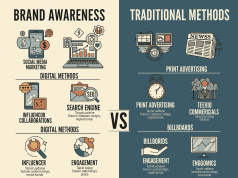In the digital marketing landscape, two giants dominate the advertising arena: Facebook Ads and Google Ads. Each platform offers unique advantages, targeting capabilities, and advertising formats that can significantly impact your business’s online visibility and sales. Selecting the right one hinges on understanding your business goals, audience, and budget. Let’s explore the strengths and weaknesses of both platforms to help you make an informed choice.
Understanding the Platforms
Google Ads
Google Ads (formerly known as Google AdWords) primarily consists of pay-per-click (PPC) ads that appear in Google search results and across the Google Display Network. Advertisers bid on keywords relevant to their products or services, and when users search for those terms, their ads may appear at the top of the search results or on partner websites.
Key Advantages:
- Intent-based Marketing: Google Ads targets users actively searching for specific terms, indicating high purchase intent. This allows businesses to capture leads when they are most interested.
- Extensive Reach: With billions of searches every day, Google is the go-to search engine, providing a vast audience.
- Trackable ROI: Google Ads offers robust analytics tools, allowing advertisers to measure the performance of their ad campaigns down to the keyword level.
Limitations:
- Cost: Depending on competition for keywords, Google Ads can be expensive, particularly for high-demand niches.
- Complexity: Setting up and optimizing Google Ads campaigns requires expertise, which can be daunting for beginners.
Facebook Ads
Facebook Ads encompass a variety of ad formats that can appear in users’ news feeds, stories, or the right-column ads on Facebook and Instagram. Advertisers can target users based on their demographics, interests, and behaviors, making it an excellent option for reaching specific audience segments.
Key Advantages:
- Highly Targeted Audiences: Facebook allows granular demographic, geographic, and psychographic targeting, which can result in higher engagement rates.
- Visual Appeal: With image and video options, businesses can create visually appealing ads to showcase products, leading to higher engagement.
- Cost-Effective: Facebook ads can be cheaper than Google Ads, particularly for brand awareness campaigns.
Limitations:
- Lower Intent: Users on Facebook may not have immediate buying intent, making conversion tracking trickier.
- Ad Fatigue: The platform’s vast array of ads can lead to audience fatigue, needing constant creative refreshes to maintain engagement.
Which is Right for Your Business?
Choosing between Facebook Ads and Google Ads depends on various factors, including your business objectives, target audience, and budget.
Consider Your Business Goals
- Brand Awareness: If your primary goal is to increase brand awareness or reach a specific audience segment, Facebook Ads may be more effective due to their robust targeting capabilities and visually engaging formats.
- Lead Generation/Sales: If you aim to generate leads or sales directly through search intent, Google Ads is likely the better option. It captures users actively seeking your products or services.
Identify Your Target Audience
Understanding where your audience spends their time is crucial. If your target demographic is active on social media and engages with content, Facebook Ads may yield better results. Conversely, if your audience is more likely to seek out information through Google, prioritize Google Ads.
Analyze Your Budget
Both platforms require a financial investment, but their cost structures differ. Google Ads may require a higher upfront budget for competitive keywords, while Facebook Ads can be more manageable, especially for businesses just starting. Consider your overall marketing budget and the potential return on investment (ROI) for each platform.
Conclusion
Both Facebook Ads and Google Ads have their strengths and weaknesses, making them suitable for different business needs. Ultimately, the best choice depends on your specific objectives, audience, and budget. For many businesses, a hybrid approach that leverages both platforms may prove most effective, allowing cross-channel marketing that can amplify results. By carefully assessing your goals and continuously optimizing your campaigns, you can harness the power of digital advertising to drive growth and success in your business.









